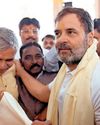
Just before the Sangam bridge over the Jhelum in Anantnag, 40km from Srinagar, there is a path to the left. Drive on it for 10km and you reach Waghama, a village of cattle rearers and apple growers not found in travel guides or geography books. Yet, from the narrow lanes and old houses has emerged a story that has not only lit up social media, but grabbed the attention of Sachin Tendulkar.
Amir Hussain Lone, a cricketer with no arms, first found fleeting fame in 2016, when then India captain Virat Kohli tweeted about him, and Tendulkar sent him a bat as his token of appreciation. It took Amir another eight years to meet his idol in the flesh, but patience and grit have been his strongest allies in life.
Born to Bashir Ahmed Lone and Raja Begum, Amir is the second of four siblings. One day, when he was eight, his mother sent him off to the family workshop with lunch for his older brother. Amir, wearing a new jacket his father had brought him from a trip to Delhi, handed over the lunchbox and began playing near the bandsaw there. “My jacket got caught in the machinery, swiftly pulling me in and severing both my arms,” recalled the 34-year-old. They did not have a vehicle and sought help from the local Army camp. A car was called, but the driver, despite the family’s pleas, dropped them off at the highway and refused to go further. The Army personnel stepped in and drove them to hospital. The stay there was long, and cost a lot. Amir’s father sold the bandsaw and some land, all the while fielding questions from nosy villagers about the need to spend so much on a “disabled boy”.
This story is from the {{IssueName}} edition of {{MagazineName}}.
Start your 7-day Magzter GOLD free trial to access thousands of curated premium stories, and 9,000+ magazines and newspapers.
Already a subscriber ? Sign In
This story is from the {{IssueName}} edition of {{MagazineName}}.
Start your 7-day Magzter GOLD free trial to access thousands of curated premium stories, and 9,000+ magazines and newspapers.
Already a subscriber? Sign In

Use multi-asset investing to overcome portfolio volatility
EQUITY MARKETS have been choppy during this year. After rallying for the better part of the first nine months of 2024, equities corrected sharply in October and November, before taking off once again on rally mode in December.

Twist of faith
Upamanyu Chatterjee is back with his wry sense of humour in his new novel, and most of it is directed at religion and spirituality

THE GLORY OF SARI
Saris of Memory weaves together history and textiles, highlighting key moments from the author's collection

We win together
We invented chess, which was pretty cool of us. The original game 'chaturanga'that is four divisions (infantry, cavalry, elephantry and chariotry)-was a war strategy game. When the game travelled to the Middle East, they mangled the Sanskrit and it ended up being called 'shatranj' instead.

BEATS THAT HEAL
Music ignites the light within us, says Grammy-winner Chandrika Tandon

Older, smarter, sexier
Those who worship him regardless of where he works have continued to do so. Such is the power of Alessandro Michele, that after being the face of some mega brands for 10 years (namely Gucci and now Valentino), he remains bigger than the labels themselves. His debut collection for Valentino was presented at the recent Paris Haute Couture Week, and it has been adored by his adorers.

The road to peace
Future political dialogues should explore means of ensuring a more robust autonomy to tribal communities

Diary of a Sherpa
Amitabh Kant's new book is a comprehensive account of the G20 Summit held in Delhi in 2023

The annoying orange
Everything is great. All is sunshine. I am an eternal optimist.\" It's the fad of our TikTok times everything is not great, the sun sets daily, nothing is eternal. If anything, everything is ephemeral, night brings darkness, and optimism often crumbles under the weight of history. British philosopher Roger Scruton warned: \"Hope untempered by the evidence of history is a dangerous asset, one that threatens not only those who embrace it, but all those within range of their illusions.\"

NO SEAT, YET UPBEAT
The Congress is buoyed by its increased vote share in Delhi, and feels it can push the AAP into further decline